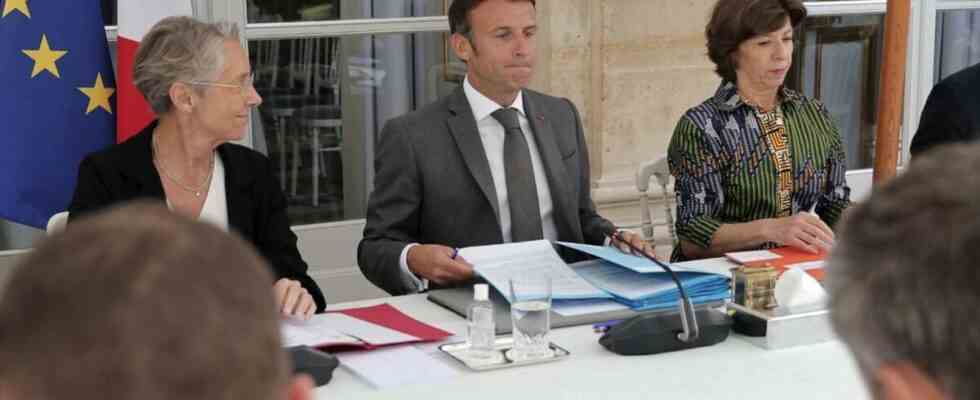Hot, tense, difficult, explosive… The press competes in adjective to describe the return of the government. The crises (international, economic, ecological, etc.) follow one another without seeming to give the government time to organize itself. All this while he does not have an absolute majority in the National Assembly, and must therefore find compromises with some of the components of the opposition. We take stock of what awaits the government from the start of the school year.
“General mobilization” for sobriety and ecological planning
We have known the more playful President of the Republic. To begin the back-to-school Council of Ministers, Emmanuel Macron called for mobilization in the face of “the big shift” that, according to him, the country is experiencing in a context of “end of abundance”, in particular of certain raw materials. As of July 14, he announced a return to school under the sign of energy sobriety, and this is the subject that the government wants to impose. During his post-Council of Ministers press conference, government spokesperson Olivier Véran referred to the speech to be delivered on the subject by Elisabeth Borne on Monday at the Medef summer school. He nevertheless warned: “There will be no restrictions imposed by the State. »
In the between two rounds of the presidential election, while trying to seduce the Melenchonist electorate, Emmanuel Macron had taken over the rebellious concept of ecological planning. “My five-year term will be ecological or it will not be,” he even launched in Marseille. After a summer marked by the very concrete effects of global warming on the territory, the government is expected at the turn, a bill on ecological planning must also be tabled this fall.
Inflation and War in Ukraine
“The priorities of the French are the priorities of the government”, said Olivier Véran this Wednesday after the Council of Ministers. And the priority of the French in this back to school if we are to believe the polls, it is inflation. Even if the price per liter of fuel has come down a little this summer, the issue of price increases remains hot. “Without triumphalism”, the government nevertheless wishes to emphasize that the measures it has taken since the beginning of the year have “limited by 1.5 points” the inflation rate in the spring according to INSEE.
If the war in Ukraine, the main reason for the soaring prices, especially of energy, seems far from over, the tariff shield will have an end. Without announcing it, Olivier Véran has nevertheless begun to prepare people’s minds for the end of the system which currently runs until the end of the year: “The debt will force us to make choices, we will not be able to indefinitely freeze prices, but we will do so gradually. An exit consistent with that of Emmanuel Macron, last week who, in the context of the war and France’s support for Ukraine, called on the French and French women to “accept to pay the price of freedom “.
Negotiations on pension reform and the tightening of unemployment insurance
It is true that we hear less about the pension reform since the re-election of Emmanuel Macron. It was the main marker of his presidential campaign: gradually bringing the legal retirement age to 65. In between, he only seemed to go to age 64, leaving his or her successor to decide what to do next. The minister in charge of the file, Olivier Dusspot, had indicated in July in The Parisian that the consultations with the unions took place immediately after the launch of the famous National Council for Refoundation wanted by Emmanuel Macron, on September 7.
The minister announced that the reform would come into force in the summer of 2023, but the unions are seeing red. Sud and CGT have already announced a strike call for September 29 and the CFDT does not seem to be much more willing to discuss such a reform. Another project that arouses the ire of the centrals: that which must again harden access to unemployment insurance. Finally, the government speaks of “making the operation of unemployment insurance sensitive to the economic situation”, according to the words of the spokesperson, Olivier Véran, this Wednesday. Clearly, tighten the conditions of compensation in the event of favorable economic conditions, and loosen when it is the crisis. Discussions are also due to begin in early September.
The 2023 Budget
This is the big chunk of all revenue from all governments: the development, review and vote of the following year’s budget, which always takes place in the fall. In times of absolute majority, this important meeting, which allows the government to concretize its priorities, is not politically the most difficult. It will of course be different this year. Because the vote on the budget is a binding vote: to vote for it is to be in the majority. The government can try to buy abstentions, but it will take a lot. Thus, in the executive we no longer hesitate to brandish the threat of 49.3.
Article 49.3 of the constitution allows the government to have a text adopted without a vote… Unless a motion of censure is adopted immediately, in which case not only is the budget not adopted, but the government falls. It can only be used once per parliamentary session (once a year, roughly) AND for the adoption of the budget. It is hard to see the opposition already bringing down the government, especially since Nupes, LR and RN must vote on the same motion at the same time for it to pass. But it might not work every time.

